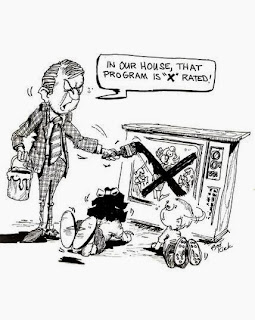At the conclusion of our findings, several consistent themes arose; agenda setting, political controversy, and globalization. These themes are all interconnected and were prominently found in our analysis of advertising, news, and film in both the United States and abroad. Agenda setting and political controversy were the most common and reoccurring themes. In Caroline’s post regarding Bassem Youssef’s freedom of expression in Egypt, she concluded that there is both agenda setting among the Egyption media and the coverage of the issue from American media. While Youssef was censored and shut down by Egyptian media outlet, CBC, he was supported by American media organizations such as the Washington Post and CNN. The CBC was attempting to perpetuate their agenda of promoting moral and societal values, while the U.S. outlets were encouraging the value of free speech.
The next theme of political controversy was closely linked
to that of agenda setting. In that media outlets in different countries have
their own specific agenda to promote, they often instigate political
controversy. Ned concluded in his analysis of Venezuelan and U.S. newspapers
that nationalistic tones created political controversy. For instance,
Venezuelan newspaper Correo del Orinoco
boldly and viciously accused the U.S. of prohibiting the U.S. of airspace for
President Nicolas Maduro. They described the U.S. as an unreasonable power only
yearning to flex their muscle. Yet, The New York Times vehemently refuted that accusation, calling it “absurd,”
and painted the Venezuelan leader and government as irrational and vitriolic.
The nationalistic tones and language created political controversy among the
two countries.
Finally, we identified the persistent theme of
globalization. In Coca-Col-ization: How Coca-Cola Advertising Embodies
Glocalization, Sarah identified glocalization as the “connection of many
cultures that forces the homogenization of all cultures,” while glocalization
ensures that the products and idea are customized to suit certain cultures.
Yet, on the other hand, cultural imperialism is an example of negative aspects
of globalization. As Todd Gitlin notes “if the American culture industry has
long depended on American formulas: Westerns, action heroes, rock music,
hip-hop. Globalized distribution expedites imitation. The American way
generates proven results,” (Gitlin, 182). As Amy notes, Hollywood “charisma
men” in Japanese commercials perpetuate the idea of the imperialism of American
culture. The romanticized exoticism associated with the Western man is shown
through Japanese commercials and imposes the cultural “ideals” of American
culture. Furthermore, the economic power of the United States contributes to
the cultural imperialism of other countries. Although the film industry of
India, Bollywood has seen astounding success, the monetary supremacy of the
U.S. has in many ways proven too difficult of an obstacle to overcome.
Consequently, U.S. film is still considered a dominant cultural power affecting
countries across the globe. the world.
We have thoroughly enjoyed contributing to this blog.
Through doing this, we have learned how important media literacy is to
understanding the different sides of an issue as well as how vital it is to
interrupting the agendas of those sides. We encourage the readers of our blog
to be willing to be critical of media both in the United States and
abroad.









